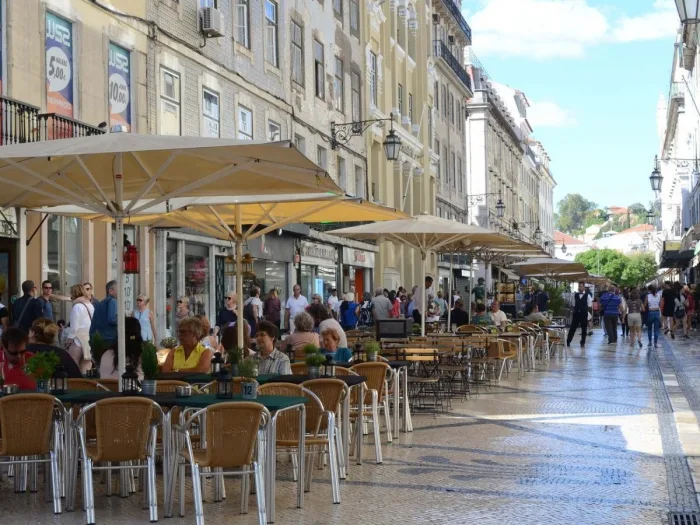As the global retirement cohort moves at an accelerated pace, theImmigration to PortugalIt's becoming a "silver hairimmigrants"The new favorite. Compared with other popular countries in Western Europe, this place has a pleasant climate, a leisurely pace of life, superior welfare protection and friendly tax policies. The following is from the cost of living, medical care, tax benefits, cultural life and other aspects, to take you to test the truth of the "first choice for retirement immigrants".
I. Cost of living: saving about 40-50% compared with the United States
-
Rent and daily expenses
According to information, the overall cost of living in Portugal is about 40-45% lower than in the United States. In Lisbon, for example, the monthly rent for a one-bedroom apartment in the city center is about €800 (about $900), while the center of Porto is slightly lower, about €670; if you choose the countryside or a second-tier city, such as the Alentejo or the Algarve, the rent can be as low as €350-450.Daily Consumption: Basic family monthly expenses (including food, transportation, utilities, etc.) about € 1,200-1,500 ($1,300-1,650) , than the average U.S. higher than the first-tier cities to save a lot.
-
Meals and cost of living
A meal for two in a mid-range restaurant costs about €30-35, compared to at least $60-80 in the U.S. Supermarket prices for fruits, vegetables, seafood and meat can be as much as 40-50% less. In the Algarve, small town supermarkets cost only €200-300 per month, which is far less than in the US.
II. Medical benefits: both high quality and low cost
The Portuguese healthcare system is internationally renowned: the World Health Organization ranks it 12th in the world. Public healthcare is available to all residents (including immigrants), and public transportation in Lisbon is free for those over 65 years of age, which is a great benefit. If you choose private insurance, monthly premiums start at only €50, and outpatient and hospitalization costs are generally lower than in the United States, making it particularly cost-effective.
Actual measurement: a general specialist outpatient clinic 40-90 euros, hospitalization for a week maximum cost of about € 200 (including medicine and food), if the purchase of insurance costs are significantly reduced. Many are more cost-effective than in the United States, becoming a strong support for retirement migration.
III. Tax advantages: NHR and double agreements
Portugal has introduced the NHR (Non-Habitual Resident) system, which offers tax benefits for up to 10 years: most foreign pensions are tax-free. The double taxation agreement with the United States of America also ensures that there are no double deductions and that immigrant retirees can enjoy their pensions with peace of mind.
IV. Quality of life: safety, livability and community
-
Climate and environment
Portugal has a mild climate, characterized by the north and south coasts and the interior: warm winters, cool summers and plenty of sunshine for outdoor daily life for the elderly. -
Community and Language
The local people are friendly and tolerant, and an English-speaking environment is common. However, in rural areas, there is a high proportion of Portuguese speakers, and retirees are advised to learn the basics of communication to minimize barriers to life. -
foreign peer group
In the Algarve, Lisbon and other places, there are mature Chinese/European and American retirement communities for the "silver-haired". These communities share medical, cultural and recreational resources, which in effect reduces the stress of adaptation.
V. Real-life experience: strengths and challenges coexisting
-
Success Stories
Many retirees say the experience exceeded their expectations: paying less for a higher quality of life, enjoying fresh local food, sunshine and warm socializing, and fulfilling the definition of "retirement living". -
Challenge Reminder
However, there are also those who admit to encountering practical obstacles: language restrictions, slow administrative processes, and age restrictions on health insurance. One retired American couple chose to return to their home country because they were unable to continue their private health insurance after age 70, and because of long waiting lists for public healthcare. This is a reminder that variables such as location, visas, insurance, and language skills need to be prepared in advance to avoid compromising the retirement experience.
VI. Consolidated recommendations: four core recommendations
-
Rental Priority Pilot: 30 days to try out the local area and experience the living environment and daily rhythms. Platforms such as Expatsi are recommended.
-
Handling of NHR: Consult a tax professional in advance to develop a pension tax-free plan.
-
Health insurance preparation: Long-term private insurance before age 65, with the possibility of switching to a public/hybrid program after age 65.
-
Language and community integration: Enroll in a Portuguese language course and join a local Chinese or international retirement society to really integrate into life.






